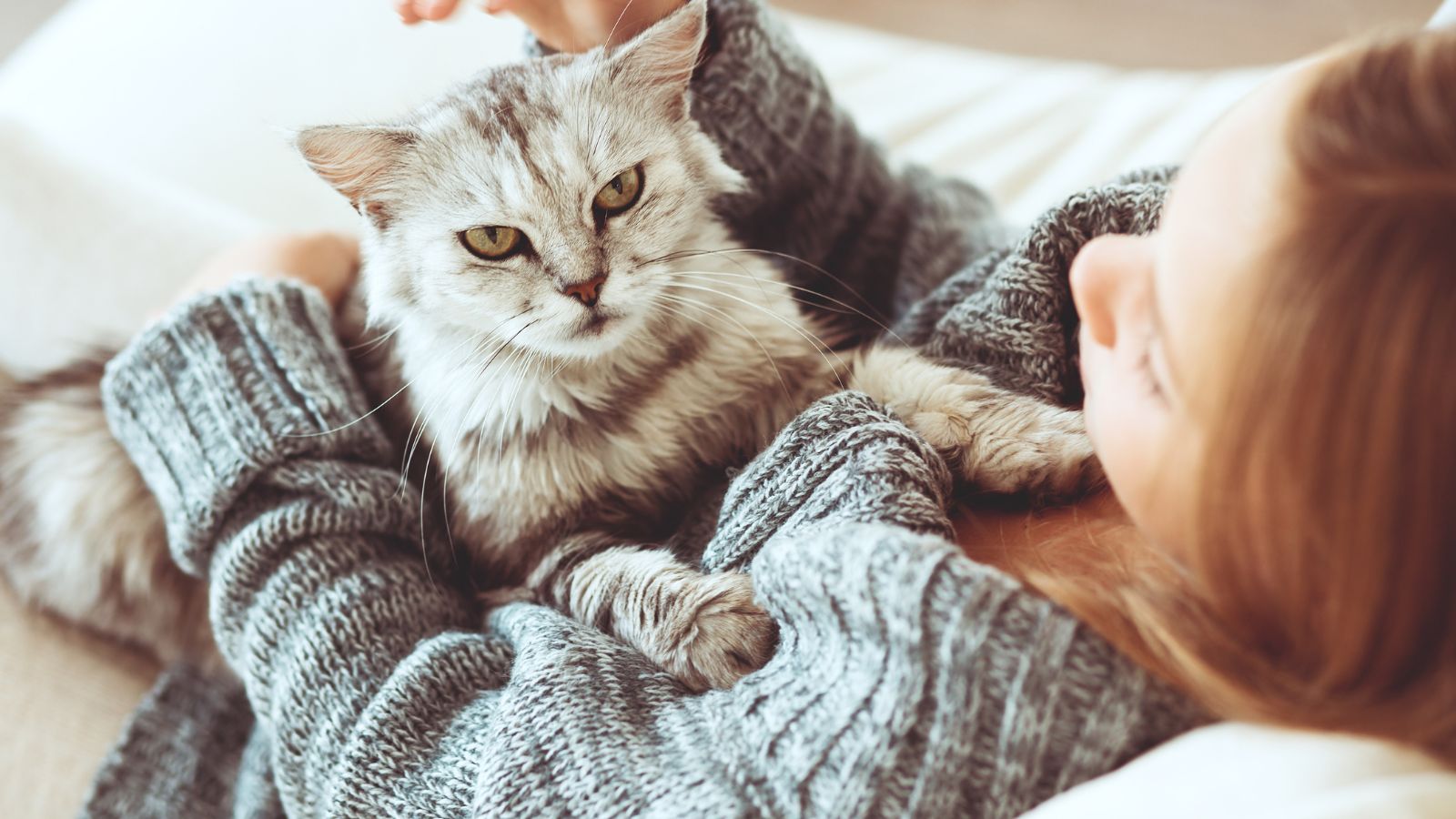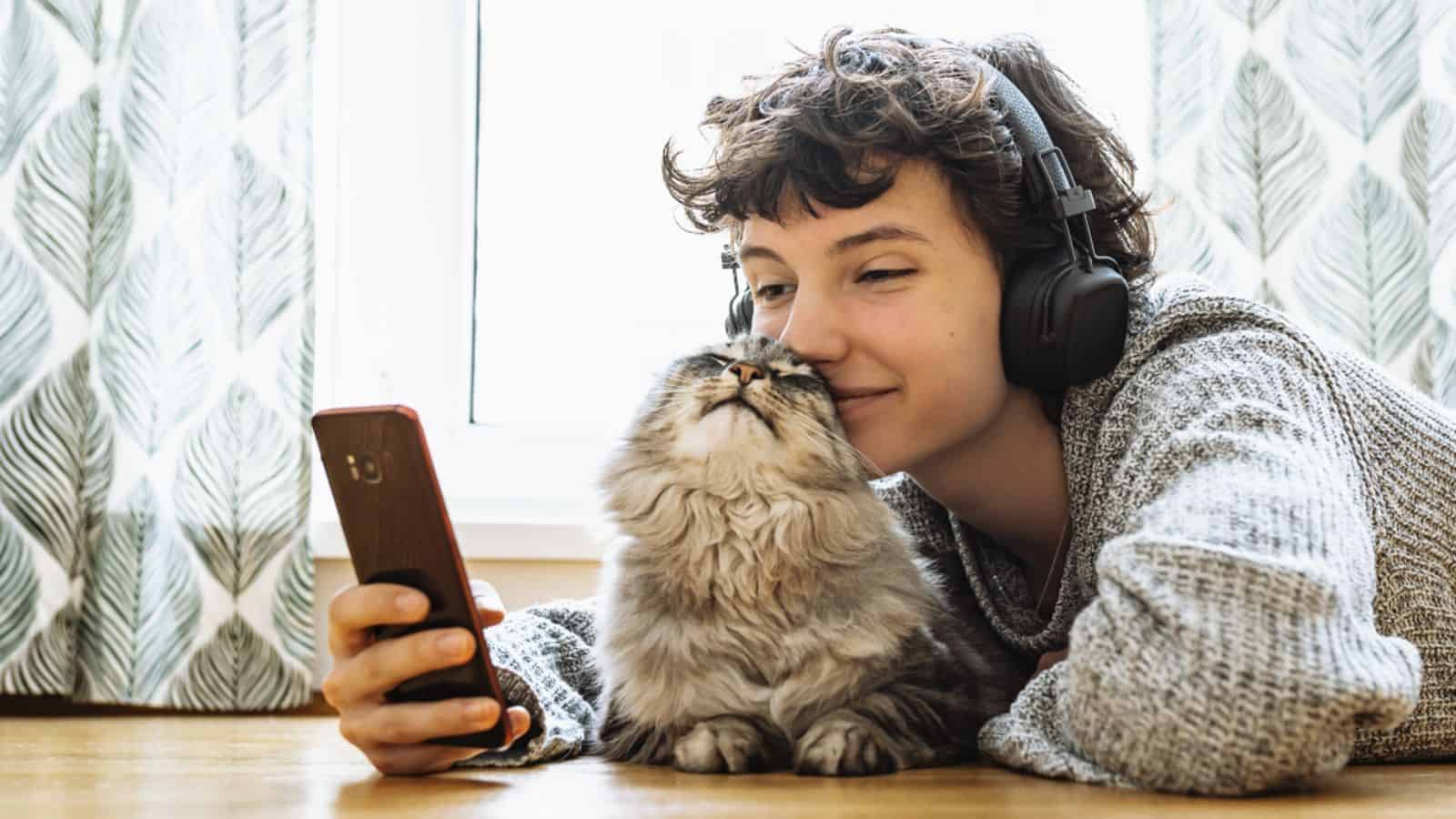It’s pretty easy to tell if a dog likes you. Their enthusiastically wagging tails and expressive body language help them easily communicate their affection. However, when it comes to cats, their loving gestures can be a little more subtle. To help you understand how your cat really feels about you, we’ve compiled 18 traits that mean cats secretly adore their owners.
Bringing Gifts

Cats are known to bring their owners “gifts,” such as toys or random household objects, to show their love. Unfortunately, according to Catster, these gifts can also come in the form of small prey animals. While this may not be the most pleasant gift to receive, it’s still a good idea to respond positively to acknowledge their affectionate gesture.
Slow Blinking

While cats may perceive prolonged, intense eye contact as a threat, they do enjoy soft eye contact with slow blinks. When a cat blinks slowly at you, this means they like and trust you, indicating that they feel comfortable and happy in your presence.
Following You Around

While cats definitely value their independence and alone time, those who love their owners will often follow them around from room to room to express their interest and love. Even if they aren’t actively seeking out pets or physical affection, wanting to be close to you is a strong indicator that they see you fondly.
Kneading

Kneading—the feline behavior of repeatedly pressing their paws into a soft surface—is a strong indicator that a cat feels comfortable, relaxed, and content. According to the AAHA, this behavior is rooted in their kittenhood, when they knead their mothers to stimulate milk production. However, kneading commonly sticks around into adulthood and often suggests that your cat associates you with comfort, affection, and contentment.
Showing Their Belly

A cat’s belly is a particularly vulnerable area, so showing their belly to you is a big display of trust and affection. Some people mistakenly think that a cat that rolls over always wants belly rubs, but even cats who hate belly rubs may do this to show their affection and contentment.
Headbutting or Nuzzling

Cats who love their owners will often headbutt or nuzzle them to “claim” them with their scent. This behavior is also commonly used as a greeting and sign of affection. You can reciprocate this action by gently petting them back or holding out your fist to encourage the nuzzling.
Purring

Cats can purr for numerous reasons. For example, according to New Scientist, they can purr to solicit food or to relieve stress. However, it usually indicates a high level of contentment and affection. So if you notice that your cat often purrs when you’re close by or giving them pets, it’s likely that they secretly adore you.
Sleeping with You

Cats can be rather particular about their sleeping habits, so if a cat chooses to sleep on or next to you, this is one of the highest compliments they can give you. It shows that they feel completely safe and comfortable in your presence and want to be near you.
Grooming You

Another common affectionate feline behavior is grooming. Cats who love their owners will often lick or nibble at their skin to strengthen their bond with you and show their affection. However, in rare cases, excessive licking can also be a sign of underlying mental or behavioral issues.
Bringing Toys to You

Affectionate kitties are known to present their owners with toys, either as a gift or as a sign that they want to play with you. In either case, this is a sure sign that your feline friend loves spending time with you and is keen to show you that they love you.
Chattering at You

Sometimes, cats will make a distinctive chirping or chattering sound when interacting with their humans or looking at birds outside of a window. While this can be a simple expression of excitement, it can also be a sign that they’re sharing their enthusiasm and hunting experience with you.
Sitting on Your Belongings

A cat’s sense of smell is much stronger than a human’s. In fact, according to PAWS Chicago, it’s about 14 times better. This is why cats are easily able to pick up your scent on household objects and may choose to sit on your belongings to feel closer to you and your scent. If you notice your cat doing this, it’s a good sign they love being near you.
Tail Twitching and Wrapping

A cat’s tail movements don’t always mean they are irritated, anxious, or aggressive. Sometimes, a slightly twitching tail can indicate that they are relaxed and happy to be around you. They sometimes also wrap their tail around a part of your body, such as your hand or arm, to show their affection.
Bunting

Bunting is another form of feline affection, similar to headbutting. If a cat rubs its head or face against you, it is showing you love and marking its scent on you to claim you as part of the family. This is a sure sign that a cat loves you and wants to keep you around.
Giving You “Love Bites”

Cats don’t always bite out of aggression or fear. Sometimes, they will gently nibble their owners as a form of play or to show their affection. These “love bites” will be softer and more playful than aggressive bites. If your cat’s biting becomes too rough, you should tell them “no” and pull away to set your boundary.
Following Your Routine

Cats are intelligent creatures who pay attention to their owners’ habits and routines. If your cat comes to the door to greet you, follows you around the house, or waits for you to appear, this is a good sign they are interested in your life and want to spend time around you.
Mirroring Your Actions

If a cat often mirrors your emotions or actions, this can be a profound sign of their empathy for you and their connection with you. Despite what some people say, cats can be very loving and emotional creatures who can be surprisingly attuned to their owners’ emotions and needs.
Escaping to Bring You Back

This may sound like a strange one, but it’s actually quite common for some cats to dash out of a door before swiftly returning to their owners. They often do this to show that while they value their independence, they still love and trust you, viewing you as their safe haven they can always return to.

